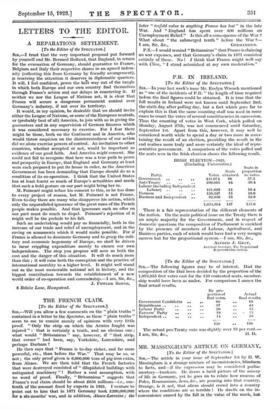LETTERS TO THE EDITOR.
A REPARATIONS SETTLEMENT.
[To the Editor of the SPECTATOR.]
SIR)—I trust that the very important proposal put forward by yourself and Mr. Bernard Holland, that England, in return for the evacuation of Germany, should guarantee to France, Belgium and Italy their respective shares in an agreed indem- nity (collecting this from Germany by friendly arrangement), is receiving the attention it deserves in diplomatic quarters. It will, I feel confident, prove the bet way out of the tangle in which both Europe and our own country find themselves through France's action and our delays in countering it. If neither we nor the League of Nations act, it is clear that France will secure a dangerous permanent control over Germany's industry, if not over its territory.
It would, in my opinion, be desirable that we should invite either the League of Nations, or some of the European neutrals, or (probably best of all) America, to join with us in giving the guarantees and in any supervision of German finances which it was considered necessary to exercise. For I fear there might be those, both on the Continent and in America, who would throw suspicion on the disinterestedness of our action did we alone exercise powers of control. An invitation to other countries, whether accepted or not, would be important as evidence of our good faith. And America might consent. She could not fail to recognize that here was a true path to peace and prosperity in Europe, that England and Germany at least were each prepared to put its house in order, as the American Government has been demanding that Europe should do as a condition of its co-operation. I think that the United States has at least learnt so much of Europe's actualities and needs that such a bold gesture on our part might bring her in.
M. Poineare might refuse his consent to this, as he has done to every project of reason, but M. Poineare is not France. Even to-day there are many who disapprove his action, which only the unparalleled ignorance of the great mass of the French people makes possible. And that ignorance such an offer on our part must do much to dispel. Poincare's rejection of it might well be the prelude to his fall.
Such an undertaking would pay us financially, both in the increase of our trade and relief of unemployment, and •in the saving on armaments which it would make possible. For if France is allowed to dominate Germany and to grasp the mili- tary and economic hegemony of Europe, we shall be driven to incur crippling expenditure merely to ensure our own independence. The step you propose will save us both the cost and the danger of this situation. It will do much more than this ; it will raise both the conception and the practice of international morality to a higher level. It might well stand out as the most memorable national act in history, and the biggest contribution towards the establishment of a new world order of co-operation and comradeship.—I am, Sir, &c., 8 Belsize Lane, Hampstead.
J. FOWLER SHONE,


































 Previous page
Previous page